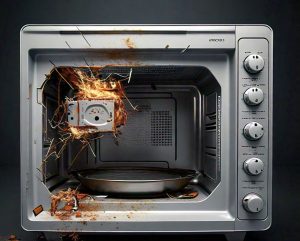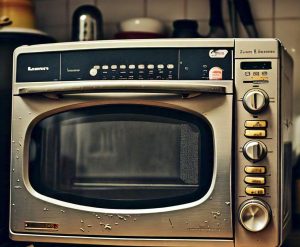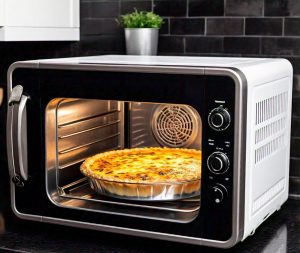A microwave is an electronic kitchen appliance used to heat or cook food by exposing it to electromagnetic radiation in the microwave frequency range.
The question here is not about microwaving a particular item, but rather whether you can legally and safely throw a microwave into a dumpster.
This article will provide detailed information on disposing of old or broken microwaves, focusing on whether it’s permissible to discard them in dumpsters. We will discuss the environmental implications and legal restrictions associated with getting rid of a microwave. If dumping microwaves in dumpsters isn’t advisable or allowed, we’ll explore alternative disposal methods that are safe and environmentally friendly. Expect valuable insights backed up by tips for proper disposal along with answers to frequently asked questions related to this issue at hand. A final word summarizing our discussion will conclude the piece.

Jump To:
Is it Possible to Throw a Microwave in the Dumpster?
No, you cannot simply throw a microwave into a dumpster. Microwaves are categorized as electronic waste or e-waste and need specialized disposal procedures due to their hazardous components like heavy metals. Instead, consider alternatives such as recycling programs or electronic waste pick-up services that specialize in disposing of items of this nature safely and correctly.
Facts About Throwing a Microwave in the Dumpster
Here, we will discuss the important things to note about throwing a microwave in the dumpster.
- Legal considerations: It is illegal in some regions to dispose of electronic waste, including microwaves, by simply throwing them into the trash or dumpster.
- Hazardous components: Microwaves contain hazardous materials like heavy metals and chemicals that can be harmful if they leach into groundwater when disposed of improperly.
- Eco-friendly disposal solutions: There are better ways to get rid of an old microwave such as recycling it or taking it to an e-waste processing facility.
- Lifespan of Microwaves: A typical microwave oven lasts for around ten years. Hence, responsible disposal is essential given their lifespan and potential environmental impact.
Having discussed these key points about discarding microwaves responsibly, let’s now delve into specifics regarding how one might actually go about disposing of or even recycling a microwave oven properly.
Facts About Microwaving
Here we will discuss the important things to note about microwaving.
- Heating Efficiency: Microwaves heat food quickly and efficiently by emitting waves that excite water, fat, and sugar molecules directly.
- Nutrient Preservation: Since microwaving often requires less cooking time than other methods, it can better preserve nutrient content in foods.
- Safety Measures: It’s critical to use microwave-safe containers while heating food to prevent toxins from leaching into your meals.
- Microwave Radiation: Modern microwaves are designed to keep radiation levels below harmful levels as defined by international standards.
- Cooking Uniformity: To ensure more uniform heating of the food, it’s recommended to occasionally stir or rotate your dish during microwaving.
In conclusion of this section on facts about microwaving, let us now delve a bit deeper into exploring aspects related specifically to disposing a microwave unit.

Frequently Asked Questions (FAQs)
We will now look at the most commonly asked questions related to microwaving and heating.
Can you throw a microwave in the dumpster?
No, you should not throw a microwave in the dumpster. The safe disposal of electronic appliances like microwaves involves recycling or donating them for reuse. Dumpsters are usually reserved for non-hazardous waste, whereas microwaves contain components that can potentially harm the environment if not disposed of properly.
Is it safe to heat food in a microwave multiple times?
Yes, it is safe to heat food multiple times in a microwave as long as you ensure that each time it’s reheated, it reaches an internal temperature of 165 degrees Fahrenheit. However, repeated heating can degrade the quality and nutritional value of the food over time.
How long should I microwave water for it to boil?
The duration needed to boil water in a microwave typically varies based on its wattage. Generally speaking though, one cup (250 mL) of water will take about 1-3 minutes to reach boiling point when heated on high power setting.
Can microwaved food cause cancer?
No evidence supports that eating microwaved food causes cancer. Microwaves simply heat your food using electromagnetic waves; they do not make your food radioactive or harmful when used correctly and maintained regularly.
This brings us to conclude our frequently asked questions section regarding heating and microwaving concerns.
Final Word
Microwave technology provides convenient cooking solutions by reducing cooking times substantially as compared with conventional methods. Although there are myths about this kitchen appliance’s health effects, scientific consensus assures us about its safety provided it’s used correctly. For any concerns about microwaving and heating, local environmental or health agencies can provide accurate information based on scientific evidence.



